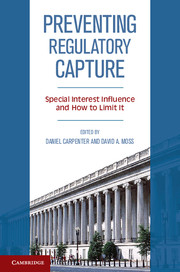Book contents
- Frontmatter
- Contents
- List of Figures
- List of Tables
- Editors
- Contributors
- Preface
- Acknowledgments
- Introduction
- Section I Failures of Capture Scholarship
- Section II New Conceptions of Capture – Mechanisms and Outcomes
- Section III Regulatory Case Studies
- 8 Capturing History
- 9 Conditional Forbearance as an Alternative to Capture
- 10 Captured by Disaster? Reinterpreting Regulatory Behavior in the Shadow of the Gulf Oil Spill
- 11 Reconsidering Agency Capture During Regulatory Policymaking
- 12 Coalitions, Autonomy, and Regulatory Bargains in Public Health Law
- Section IV The Possibility of Preventing Capture
- Conclusion
- Afterword
- Index
- References
10 - Captured by Disaster? Reinterpreting Regulatory Behavior in the Shadow of the Gulf Oil Spill
Published online by Cambridge University Press: 05 June 2014
- Frontmatter
- Contents
- List of Figures
- List of Tables
- Editors
- Contributors
- Preface
- Acknowledgments
- Introduction
- Section I Failures of Capture Scholarship
- Section II New Conceptions of Capture – Mechanisms and Outcomes
- Section III Regulatory Case Studies
- 8 Capturing History
- 9 Conditional Forbearance as an Alternative to Capture
- 10 Captured by Disaster? Reinterpreting Regulatory Behavior in the Shadow of the Gulf Oil Spill
- 11 Reconsidering Agency Capture During Regulatory Policymaking
- 12 Coalitions, Autonomy, and Regulatory Bargains in Public Health Law
- Section IV The Possibility of Preventing Capture
- Conclusion
- Afterword
- Index
- References
Summary
As this volume aptly illustrates, regulatory capture – which Daniel Carpenter and David Moss describe in the Introduction as a condition whereby regulation is applied for the benefit of the regulated entities as opposed to the public interest – has occupied the fascination of researchers from a wide variety of academic fields for a long time. However, in terms of salient examples, at first glance the plight of the Minerals Management Service (MMS), a defunct agency of the Department of the Interior (Interior) that employed roughly 1,600 federal workers, presents perhaps the clearest case of capture in recent history. Not only did behavior at the agency provide rare public confirmation of the types of activities including bribery and excessive gift exchange that theorists have predicted do occur with captured regulatory relationships, drug use and sexual misconduct involving MMS employees and their industry counterparts revealed evidence of actions that extend beyond those that even captured agencies typically display. Support for MMS's failure was tangible given its association with the April 2010 Deepwater Horizon oil rig fire and subsequent spill that deposited roughly 4.9 million barrels of oil into the Gulf of Mexico and had historians debating its place on the list of worst environmental disasters in U.S. history.
With these facts in hand, it is not surprising that a large number of observers regarded capture as central to explaining the oil spill and MMS's role in facilitating it. For this reason, most attention focused on why MMS was captured and what should be done about it, relative to serious consideration of both the extent to which the agency was captured and how important this factor was in understanding why the spill might have occurred. Two popular theories surfaced to explain the apparent failure of MMS, one emphasizing the role of the agency's outwardly conflicting missions and the other focusing on the collaborative stance adopted by the agency toward its regulated industry.
- Type
- Chapter
- Information
- Preventing Regulatory CaptureSpecial Interest Influence and How to Limit it, pp. 239 - 291Publisher: Cambridge University PressPrint publication year: 2013
References
- 2
- Cited by



